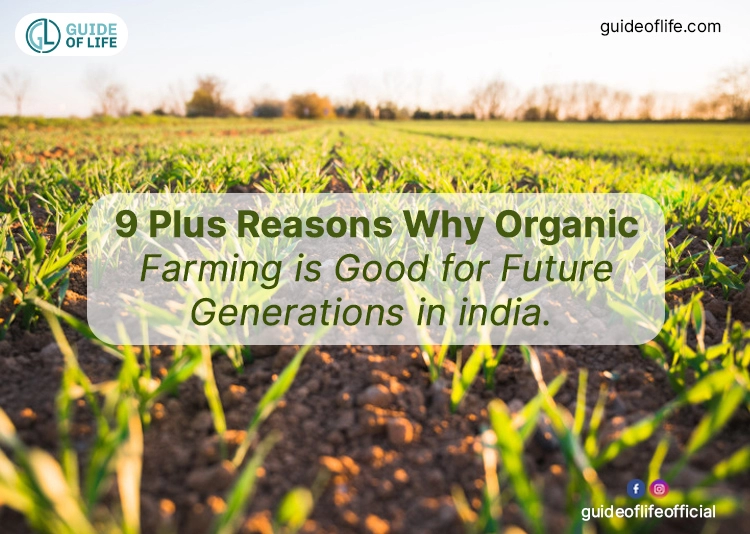9 Plus Reasons Why Organic Farming is Good for Future Generations in India

Organic farming is a form of agriculture that uses natural methods and inputs to grow crops and raise animals, without relying on synthetic chemicals, such as pesticides, fertilisers, hormones, and antibiotics. Organic farming has many benefits for you and future generations, both in terms of health and environment. Here are some of the reasons why organic farming is good for you and future generations:
Types of Organic Farming:
- Crop Rotation: Alternating crops to improve soil fertility and reduce pests.
- Companion Planting: Planting mutually beneficial crops together to deter pests and enhance growth.
- Organic Pest Management: Using natural predators and non-toxic methods to control pests.
- Cover Cropping: Planting cover crops to protect soil, improve nutrient content, and prevent erosion.
- Organic Fertilisation: Using compost, manure, and organic materials to enrich soil.
- No-Till Farming: Reducing soil disturbance to preserve soil structure and minimise erosion.
- Polyculture: Growing multiple crop species together to enhance biodiversity and reduce vulnerability to pests.
- Agroforestry: Integrating trees and crops to improve soil health and provide additional yields.
- Aquaponics: Combining aquaculture (fish farming) and hydroponics (soilless plant cultivation) in a symbiotic system.
- Biodynamic Farming: A holistic approach incorporating lunar cycles and spiritual elements to enhance sustainability.
Why is Organic Farming Good in India?
1. Healthier food for you:
Organic food is free from harmful residues of synthetic chemicals that can accumulate in your body and cause various health problems, such as allergies, asthma, cancer, diabetes, and infertility. Organic food also contains higher levels of antioxidants, vitamins, minerals, and phytochemicals than conventional food. These compounds have beneficial effects on your health, such as boosting your immune system, reducing inflammation, preventing oxidative stress, and lowering the risk of chronic diseases.
2. Water Conservation
Water is super important, and organic farms use less of it compared to other farms. By saving water now, we're making sure there's enough for the future.
3. Nutrient-rich produce:
Organic farming enhances the soil quality by increasing its organic matter content, biological activity, structure, and fertility. This results in more nutrient-rich produce that can provide you with essential nutrients for your growth and development. For example, organic tomatoes have higher levels of lycopene, a powerful antioxidant that can protect you from prostate cancer. Organic carrots have higher levels of beta-carotene, a precursor of vitamin A that can improve your vision and skin health.
4. No Harmful Additives:
Organic food does not contain any artificial additives, such as preservatives, colorings, flavourings, sweeteners, and enhancers, that can affect your health negatively. For example, some artificial preservatives can cause allergic reactions, headaches, nausea, and asthma attacks. Some artificial colorings can cause hyperactivity, attention deficit disorder, and learning difficulties in children. Some artificial sweeteners can increase your appetite, weight gain, and blood sugar levels.
5. Environmental conservation:
Organic farming protects the environment by reducing greenhouse gas emissions, water pollution, soil erosion, and biodiversity loss. Organic farming uses less fossil fuel than conventional farming, as it does not rely on synthetic inputs that require high energy inputs to produce. Organic farming also avoids the use of synthetic fertilisers and pesticides that can leach into groundwater and surface water, contaminating the water sources and affecting aquatic life. Organic farming also improves the water infiltration and retention in the soil, reducing runoff and evaporation. This helps to conserve water and ensure its availability for future generations.
6. Preserving soil quality:
Soil is the foundation of life on Earth, and it provides many essential functions for humans and ecosystems. Organic farming preserves the soil quality by increasing its organic carbon content, which acts as a sink for atmospheric carbon dioxide and mitigates climate change. Organic farming also increases the soil biodiversity by creating diverse and complex agro-ecosystems that host a wide range of species. These species help to maintain the soil health by performing various functions, such as decomposing organic matter,
7. Biodiversity Promotion:
Organic farming supports biodiversity by creating diverse and complex agro-ecosystems that host a wide range of species, such as plants, animals, insects, fungi, and microorganisms. These species provide many benefits for humans and ecosystems, such as pollination, pest control, nutrient cycling, genetic resources, and cultural values. Organic farming also avoids the use of genetically modified organisms (GMOs) that can pose risks to the environment and human health, such as gene flow, ecological imbalance, and allergic reactions.
8. No GMOs:
Organic farming does not use any genetically modified organisms (GMOs) that can alter the natural characteristics of crops and animals. GMOs are organisms that have been artificially modified by inserting genes from other species, such as bacteria, viruses, animals, or plants. GMOs can have unpredictable and unintended effects on the environment and human health, such as gene flow, ecological imbalance, allergic reactions, antibiotic resistance, and cancer. Organic farming preserves the natural integrity and diversity of crops and animals, which is essential for food security and adaptation to environmental changes.
9. Protecting future generations:
Organic farming protects the health and well-being of future generations by providing them with safe and nutritious food, clean and abundant water, fertile and productive soil, stable and diverse climate, and rich and varied biodiversity. Organic farming also ensures the sustainability of natural resources and ecosystems that future generations depend on for their survival and development. Organic farming also respects the rights and interests of farmers and consumers who produce and consume organic food.
10. Local Economies:
Organic farming boosts local economies by creating more employment opportunities, income sources, market access, and social capital for rural communities. Organic farming employs more people than conventional farming, as it requires more labour-intensive practices and skills. Organic farming also generates more income for farmers by offering them premium prices for their organic products. Organic farming also creates more market opportunities for farmers by connecting them with local consumers who demand organic food. Organic farming also strengthens the social capital of rural communities by fostering trust, cooperation, participation, and empowerment among farmers and consumers.
Conclusion
The adoption of organic natural farming in India is not just a trend; it is a vital step towards ensuring a better future for the generations to come. The health benefits, environmental stewardship, economic advantages, and long-term sustainability of organic farming make it a crucial component of India's agricultural landscape. By embracing organic practices, we can leave a healthier, more sustainable world for our children and grandchildren.

